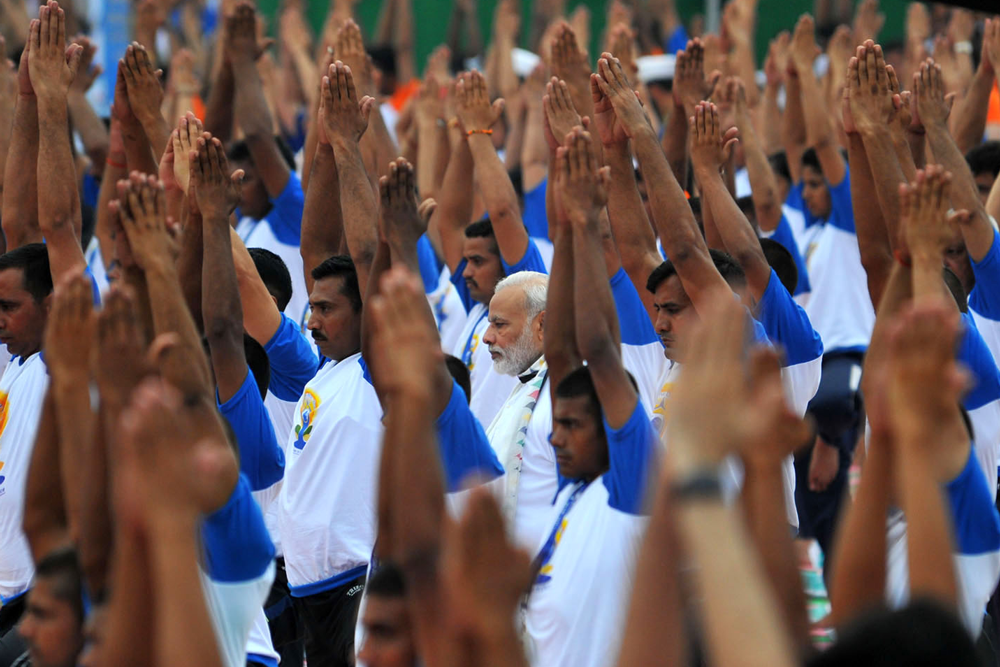
The new year is the fitness and well-being sector’s Christmas. People all around the world actualise intentions to start the new year afresh and the go to activity that has enormous reach on both the ambitions of being fit and feeling good is yoga.
Over recent years, there have also been remarkable attempts to harness the commercial and political power of the yoga movement. Presenting this ancient practice with the question, “who owns yoga and why are people trying to own it?”
Yoga is incredibly difficult to define. In a literal linguistic sense it means union which in Sanskrit breaks down as "yuj" (pronounced "yug") meaning "to join" or "to unite" but it’s meaning and interpretation, much as many other terms in Sanskrit, expand much wider than that. Most people understand the non-philosophical meaning of yoga as the practice of physical exercise (poses or “asana”), relaxation, meditation, and breathing techniques.
It has fallen on people who do not consider themselves Hindus or Indians to defend yoga’s universality
On 11 December 2014, the UN General Assembly adopted, without a vote, a resolution commemorating 21 June as the International Day of Yoga. Addressing the Assembly, India’s Prime Minister Narendra Modi said:
"Yoga is an invaluable gift of India's ancient tradition. It embodies unity of mind and body; thought and action; restraint and fulfilment; harmony between man and nature; a holistic approach to health and well-being. It is not about exercise but to discover the sense of oneness with yourself, the world and the nature. By changing our lifestyle and creating consciousness, it can help us deal with climate change."
Modi is probably the world leader best known for his yoga practice (with the possible exception of Justin Trudeau’s planking). He is also known for gaining power through the prism of Hindu nationalism in what is still technically supposed to be a secular state. As well as establishing a UN international day, he has created the Ministry of AYUSH or Ayurveda, Yoga, Naturopathy, Unani, Siddha and Homeopathy.
The Minister of Yoga and Traditional Medicine, Shripad Yesso Naik, stated the government wants to “establish to the world that yoga is ours.” Specifically, the Indian state seems to want yoga to have the geographical indication and authenticity of something like how champagne is to France. However, conceptually, practically and logically, restricting the idea or fact of yoga to India is almost impossible compared to limiting the regional denotation of sparkling wine goods.
But the battle to control the term yoga in a legal context was fought and lost last year, in a landmark case that argued yoga is more than just a prescribed series of movements.
In 2015, an American judge decided that yoga is a concept and is not something that can be owned by an individual, which set a precedent for how people use the term. Judge Kim McLane Wardlaw was nominated to the United States District Court for the Central District of California in 1995 by President Clinton. She, in keeping with political appointments to the bench in America, had previously served on the Clinton presidential transition team working with the United States Department of Justice. Judge Wardlaw has been described as a “soccer mom who drives a Jaguar” and “a brilliant jurist who seeks practical solutions to complex legal and social problems.” It is unclear whether she foresaw the impact of a judgment of a copyright case that she delivered on 8 October 2015.
Bikram Choudhury was born in Kolkata in 1946 and asserts he began yoga from the age of four and learnt at the "College of Physical Education" of Bishnu Charan Ghosh, one of the most popular physical culturists of that time. Bishnu was the younger brother of the revered Paramahansa Yogananda, author of "The Autobiography of a Yogi", one of the most important Indian spiritual texts of the twentieth century and which led to the foundation of the international movement, the Self-Realization Fellowship.
A yoga pose or sequence is an idea or a fact, and you cannot copyright an idea or a fact
Bikram was a stand out student and when he had sufficient experience, he obeyed his teacher’s instruction to spread the path of yoga in the west and America. He left India in 1971 at the age of twenty-five. Over the course of the next forty years, he became a central figure in the growing popularity of yoga in America, and was dubbed "Yogi to the stars" heightened by his location in Beverly Hills, California.
What is unclear, is whether his yoga master, Bishnu Ghosh’s express wishes had included aggressive litigious behaviour including threats to sue a number of yoga teachers and studios. It is also unclear whether the old ascetic’s advice included the establishment of broad copyright protections of most aspects of the practice, teaching, and business of what was now called the "Bikram Sequence."
By the time Judge Wardlaw and her fellow circuit judges sat down to consider the copyright claim in Bikram’s Yoga College of India L.P., Bikram Choudhury v Evolation Yoga LLC, Mark Drost, & Zefea Samson – Bikram’s power to control the commercial value of the yoga empire he had built was slipping.
In what is possibly one of the most fascinating copyright judgments you may ever have the inkling to read, Judge Wardlaw dismantled Bikram’s legal case. In simple terms, the court rejected the premise that a sequence of twenty-six yoga poses and two breathing exercises developed and described in the book, Bikram’s Beginning Yoga Class was entitled to copyright protection. This is because, as a fundamental matter of constitutional law and statute, copyright protection is “limited to the expression of ideas, and does not extend to the ideas themselves.”
In other words, a yoga pose or sequence is an idea or a fact, and you cannot copyright an idea or a fact. The “expression” of an idea, such as Bikram’s 1979 book about the Sequence, did have copyright protection for its content. But Bikram failed to realise that this didn’t stretch to preventing others from teaching the sequence or any part of it.
Mark Drost, the co-founder of Evolation Yoga, and the winner of the court case said prophetically,
"Bikram is the only person I’ve heard of in the history of yoga who [suggested], ‘I’m going to teach you this and tell you that you can’t go teach it,’” says Drost. "He popularized this sequence and he should get credit for that. But the fundamental thing we teach in teacher trainings is that it’s not about the teacher, it’s about empowering students, sharing knowledge, and sharing experience. I think this decision helps people get back to the spirit of what yoga is.”
According to a 2015 survey conducted by the United Nations Department of Economic and Social Affairs, India has the largest diaspora in the world of 16 million people. This is somewhat unsurprising given she is the second most populous state after China, and is projected to be the largest by 2030. Unlike China, India is also a democracy that has significant and burgeoning economic ties with affluent countries in Europe, the Middle East, and the Americas.
In 2017, as international relations adopt tectonic shifts, one subject that is unlikely to be at the forefront of discussions is the development of countries’ soft power. The concept was developed by the political scientist, Joseph Nye, who explained in his book, Bound to Lead: The Changing Nature of American Power that: “when one country gets other countries to want what it wants, might be called co-optive or soft power in contrast with the hard or command power of ordering others to do what it wants.”
The Economist’s Soft Power list commends the British hegemony in this arena of international politics through the cultural dominance of One Direction, Oxbridge and the English Premier League. Somewhat unsurprisingly, the public relations and communications agency Portland has also been enthusiastic about soft power, and even managed to summarise an extremely complex, historic, constantly-shifting and unquantifiable notion into a handy infographic:

Given the size of its diaspora, it is surprising that India is nowhere to be seen.
More generally, Modi seemingly seeks to conflate what is yoga with what is Hindu and with what is Indian. This is an important soft power goal in a globalised world where these three concepts increasingly diverge given the internationalism of the yoga movement and the millions of Hindus who are part of the diaspora community or who consider themselves People of Indian origin but not necessarily Indian. More cynically, there is the added benefit that yoga is inextricably linked to peace and calmness. Being seen on the world stage as the man of yoga could also be incredibly useful geopolitically, if conflict with the threat of nuclear weapons, emerges with Pakistan.
Modi’s domestic power is contingent on Hindu nationalism, it remains to be seen in what further forms yoga will manifest itself as soft political power on the international stage in his premiership.
To many, yoga is not a specialised physical exercise regime, it is a part of life, akin to cooking, cleaning, socialising, or relaxing. It can represent a highly personal way in which they shift their perception of the world around them. Copyright and soft power plays couldn’t be further from their head space when they are on their mats. The ability of yoga to be shared between the experienced and the inexperienced and between the philosophically-minded or physically-minded adherents alike is key to its lasting and enduring appeal.
Efforts to control the idea of yoga did not begin with Bikram and Modi, nor will they end with them. In contemporary times, it has fallen on courts and people who do not consider themselves Hindus or Indians, amongst others, to defend encroachments onto yoga’s universality.
The ancient yogi Patanjali is credited with penning the Yoga Sutras, Vedic texts that expressed philosophies underpinning yoga. In the Sutras he simply says:
“Incorrect knowledge is mistaking the identity of one thing for the other or one object for another.”